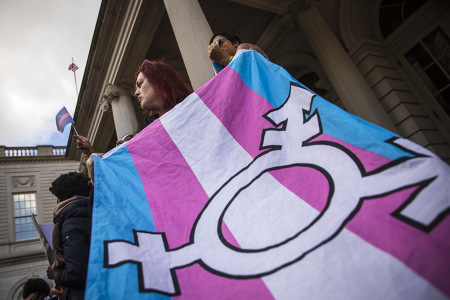The Christian Post’s top 10 news stories of 2020 (part 2)

5. Transgender movement and pushback
Transgender policies, laws, and court cases continued to advance in 2020, though some who are pushing back against the movement say the proverbial tide might be turning as greater public scrutiny regarding athletic competitions and experimental gender medicalization is starting to occur.
In June, Harry Potter series author J.K. Rowling began giving voice to her concerns about radical trans activism and its implications for women's rights, comments for which she was widely panned as a bigot in much of the media. Actors who starred in the film adaptation of her books also distanced themselves from her following her remarks.
After publishing an initial 3,600-word essay outlining her objections to gender identity ideology and legislation, Rowling subsequently said she believes that the hormonal and surgical gender-transitioning of youth who are same-sex attracted is akin to "gay conversion therapy" and that society is on the cusp of a major medical scandal.
Organizations and individuals who bought into the "fashionable dogma" of transgenderism while ridiculing those who have urged more caution will soon have to answer for the harm they enabled, she added at the time.
Three major court rulings centered around transgender policies and contested medical practices, along with the attempted censorship of a bestselling book scrutinizing the movement's impact on teenage girls, also occurred this year.
U.S. Supreme Court ruling in employment dispute
In a landmark 6-3 ruling in June, the U.S. Supreme Court ruled that it was unconstitutional for employers to fire individuals on the basis of sexual orientation and "transgender status." Doing so is a form of sex discrimination that is prohibited under Title VII of the 1964 Civil Rights Act, the high court said.
The ruling in Bostock v. Clayton County consolidated three employment disputes: two involving gay employees and one involving a transgender-identifying male (Anthony Stephens), who went by the name Aimee Stephens.
Though Stephens died weeks before the ruling was handed down, it was seen as a key victory for transgender rights. The court held that the ruling only applied to employment contexts and not to other areas of law where transgender policies are being contested.
Stephens worked for Harris Funeral Home in Michigan which had a sex-specific dress code. When he came out and identified himself as a woman, he insisted that he be allowed to wear women's clothing and be recognized as female while at work. The company could not agree to that and fired Stephens.
In the days that followed the ruling, the Atlanta Journal-Constitution reported that the claimant in the Bostock case, Gerald Bostock, was actually not fired for being gay, but for misuse of public dollars.
Bostock's former boss, Clayton County Juvenile Court Chief Judge Steven Teske, told the Georgia newspaper that he had known for many years that Bostock was gay, and was glad that Bostock won at the Supreme Court, but "there’s only so long he can hide from the truth.”
Bostock's ex-partner said he felt Teske was "thrown under the bus" because the case made it seem like he was a bigoted employer when in fact the reason Bostock was terminated was because an audit found that he had spent nearly $13,000 of court funds on meals and did not keep receipts of other expenses. The audit was a pretext to Teske firing him, Bostock claimed.
Yet even without an established factual basis of events in the case, the Bostock dispute was allowed to be heard before the Supreme Court for the purposes of adjudicating the constitutionality of the legal issues at hand.
Tavistock clinic in England loses in judicial review filed by detransitioner Keira Bell
The medicalization of gender in children and teens is arguably one of the most controversial practices that come with transgender advocacy, in light of the permanent effects on the human body, particularly the administration of puberty-blocking drugs, cross-sex hormones, and body-altering surgeries.
Earlier this year, Keira Bell, a 23-year-old woman who identified as transgender during her teen years, filed for a judicial review against the London-based Tavistock gender clinic, arguing that she was not capable of understanding the long-term repercussions of the experimental medical treatments.
Bell said she made a "brash" decision at the time and the clinic steered her down the pathway of hormonal gender-transition. She went on to have a double mastectomy and now regrets the entire process, stating that the treatments have likely compromised her fertility and that the damage to her body is irreparable.
The high court concurred, holding in its ruling that children younger than 16 are not capable of giving informed consent to take puberty blockers and other hormones under the Gillick competency, the relevant legal standard in England for when children can consent to medical treatments without parental approval.
Idaho and Connecticut
Among the most visible contexts where transgender policies are being debated publicly is in girls' sports.
In March, Idaho became the first state in the nation to ban trans-identified boys from competing in girls-only sports. Idaho also passed a separate law maintaining that state vital statistics must be preserved on the basis of biological sex.
Upon passage of the sports law, the American Civil Liberties Union promised to sue and then did, alleging that the statute was discriminatory toward trans-identified people. The law is now being contested in federal court in Hecox v. Little and will soon be heard at the Ninth Circuit Court of Appeals after a district court judge ruled that trans-identified boys have the right to participate in girls' sports.
In Connecticut, three female high school track athletes sued their state athletic association, alleging that they were denied a level playing field guaranteed to them in Title IX, the provision in the Civil Rights Act that prohibits sex discrimination in the educational arena, including sports.
The girls have said in their lawsuit and in media appearances that they want to restore basic fairness to their sport and that the athletic association's policy of permitting trans-identified males to run in their races has denied them scholarship opportunities, records, and titles because the boys almost always win due to their inherent physiological advantages.
Censorship
In June, Wall Street Journal contributor Abigail Shrier released her much-anticipated book, Irreversible Damage: The Transgender Craze Seducing Our Daughters.
Listen to CP's podcast interview with Abigail Shrier
Shrier's book explores why, for the first time in approximately 100 years of diagnostic history, the majority of young people diagnosed with gender dysphoria are girls, many of them teenagers. For most of history, the extremely rare condition was seen in young boys.
The author argues that many girls and young women are being ensnared into a largely internet-fueled peer contagion — a phenomenon Brown University researcher Lisa Littman has called Rapid Onset Gender Dysphoria — and gender-transition drugs and surgeries are irreversibly damaging their bodies.
During the lead-up to her book's publication, online retail giant Amazon forbade Shrier's publisher, Regnery Publishing, from purchasing ads to promote the book. Shrier told The Christian Post in an interview that she has been told by many podcasters and media outlets that they would love to have her on their programs but they cannot book her for fear of backlash from mostly male trans activists.
Earlier this year in California, a group of concerned parents of trans-identifying children self-funded billboards advertising Shrier's book in an attempt to generate discussion about what is happening to children. The first billboard featured the cover of Irreversible Damage alongside a message that read: "Your child is learning about gender identity in school. Puberty is not a medical condition. Get the facts. Read this book."
GoFundMe took down their crowdfunding page to put up additional billboards with no explanation given. And the billboard company reneged on their contract for a second billboard with a similar message that was erected near Kaiser West-LA hospital where transgender surgeries regularly happen. The second billboard was supposed to stay up for a month but was taken down after only a day-and-a-half amid "complaints from the community."
Brandon Showalter contributed to this report





















